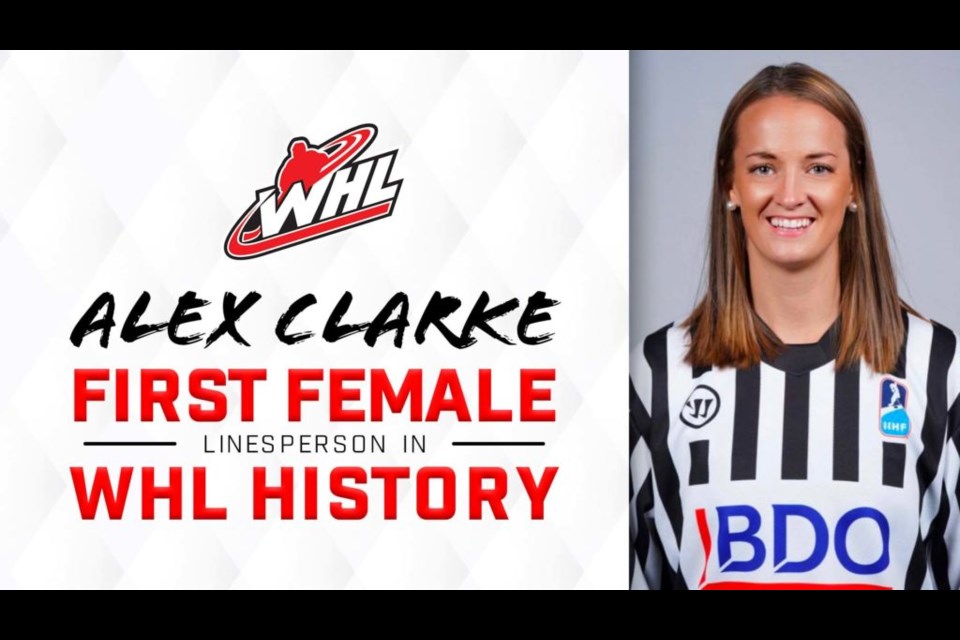ESTEVAN - Alex Clarke describes herself as a farmer who was kicked in the knee by a cow, was forced to give up playing hockey, had a chance encounter with a hockey leader and worked her way up the hockey officiating ranks.
She has become a trailblazer in the sport.
But she's also a wife and a mom who loves agriculture and wants people to enjoy the process of where they are going.
Clarke was the guest speaker at the Estevan Farmers' Appreciation Evening on Thursday night. A last-second substitute after the scheduled speakers had to back out. Clarke reflected on her experiences in which she became the first female official in the Western Hockey League (WHL), one of the first in the American Hockey League (AHL) and is now calling games in the newly-formed Professional Women's Hockey League.
She has been a referee and a linesman at many games in the Estevan area over the years, and she was also picked to officiate at the 2022 Winter Olympics in Beijing.
"I'm definitely not used to clapping, I'm more used to booing," said Clarke to laughter from the audience.
When she's not at the rink, she serves as a relationship manager with Farm Credit Canada and resides with her husband and their two children at their farm near Griffin.
Clarke was raised on a mixed operation near Drake, and moved to Weyburn at the age of 15 to play hockey with the Weyburn U18 AAA Gold Wings program for three years. When she finished university, she returned home to the family farm for a short time, but was looking for a way to stay involved in the game.
"I was … drafted to play professional women's hockey in what was the CWHL [Canada Women's Hockey League], but I was nursing a bit of a knee injury which, coincidentally, happened from a cow that kicked me, and I didn't rehab it properly, so I ended up choosing not to pursue professional hockey because my knee wasn't up for the task."
In the fall, she started working for FCC, and a short time later, had a chance encounter with the head of officiating for Hockey Saskatchewan. He encouraged her to become a referee because she could skate and had played the game at a high level.
She worked her way up through the ranks and decided she wanted something more with officiating. She reached out to the director of officials at the WHL, which she admits was frowned upon, and asked how she could improve to officiate in the league. The two met and she was given a tryout game in September 2021.
Before the game, the WHL sent out a press release celebrating her accomplishment as their first-ever female on-ice official. She continues to officiate for them.
"I didn't follow the process that all of the guys follow, I didn't follow the process that they told me I was supposed to follow. I just followed my own process, and that's OK," she said.
When she officiated a tournament in Beijing a few years ago, she was 22 weeks pregnant. But she needed that competition on her resumé if she wanted to participate in the 2022 Beijing Winter Olympics.
"There's goals that you can have, and there's so many different paths that you can take to get to those goals," she said.
Had she not enjoyed the journey of getting to the Olympics, she would have been disappointed with the end result of the Games, as COVID-19 restrictions were still in effect, which created a very different experience.
"Whether it's with the farm, whether it's with family, whether it's with something you're passionately pursuing, just be very, very wary that we don't get so focused on where we're trying to go that we don't love the whole process of getting there," she said.
She recognizes from her time growing up on a farm, and now residing in the Griffin area, that everyone has to wear many hats to make the farm succeed and for the community to thrive.
Clarke reminded the crowd that they shouldn't be afraid of failing, because "failing forward" can help them grow and improve as people.
"If we try something new, and it doesn't achieve the same results that we wanted, it doesn't get the yields that we wanted, it doesn't get whatever we wanted, that's OK, because we learned something, we grew from it, maybe we got decent yields, maybe we didn't, but we're not going to make that same mistake again," she said.




